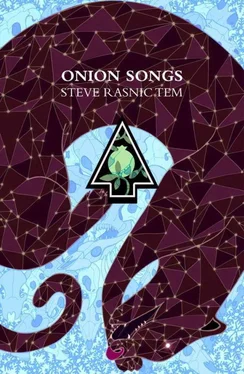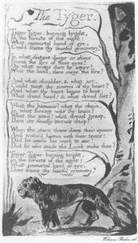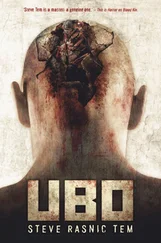All the cats had come down from the house and now gathered at the base of the birdhouse, waiting to capitalize on any avian mistakes. The howling winds on their grand bicycles regaled him with tails of mice and men.
It suddenly occurred to him that in all his doctors’ speeches not once had aphasia been mentioned as a possible symptom of his favorite, sweet disease. But he was on a diet in any case and had no time for demise.
Besides, he had never been good with words. Chopping each one down had been such hard work he’d finally switched his giant screaming baby to coal.
But what if the problem wasn’t his? Perhaps it was the world itself that had captured illness, and instead of constantly speaking the wrong word (for the world is largely mute, no matter how much you flatter it), the glory of its aphasia was that it kept bringing forth out of its nervous womb the wrong object, the incorrect animal, the mistaken human being desperate with amnesia.
But Alex was certainly no mathematician or rogue milkman of the dreamlands. He was hovel born, his mother a cello falling down a forgotten staircase, his father an unemployed cigarette embalmer.
He was no vacuum cleaner to refinish the world—he could hardly polish his own toes.
But something had to be done. The cats had stretched out his tongue and were now playing it with their tiny bows, making a music so apologetic he might cry himself awake.
The snow accumulated slowly over several weeks. No more than an inch fell in any one evening, but the best efforts of those in charge were ineffective at removing the snow the following day. The best efforts of a brilliant and uncompromising December sun were equally useless. Each night while the city slept the snow drifted down, almost imperceptibly, like a slow fall of white dust, the powder of a dream shoved against the saw blade of consciousness. And it was so cold, despite that bright sun, that the powder stayed, collected, and grew to a phenomenal depth of numbing whiteness.
Once they realized what was happening to their city, the people became alarmed, of course. Those who remained in charge were chastised for faulty preparation. Plans and strategies were devised and adopted. Promises were made. Programs were implemented. And still the slow snow accumulated. With no end in sight.
As those who pretended still to be in charge talked and studied, shouted and divided, the people of that city—singly, then collectively—eventually accepted both the cold and the depth of this December snow. Businesses closed as employees stopped showing up for work. Downed power and phone lines went unrepaired. Families gathered around and smashed their TVs. People whispered to each other in the dark at their dinner tables. Parents made up new and startling tales to reveal to their children at bedtime.
It was during this time that those who used to be in charge—out wandering the empty streets with shovels in their hands—began discovering the bodies.
The bodies were cold and well preserved. Further investigation demonstrated that they had been dead for a very long time. The bodies were those of men and women, parents and grandparents, but outnumbering all of these by a vast quantity were the bodies of the children. Thousands of children, faces immobilized, thoughts frozen in mid-formulation. Stuck behind trees, cradled in frosted bushes, stacked along the streets like earth-filled sacks damming a flood. No attempt had been made to hide their bodies. Their small still forms lay scattered like indecision.
Those who hoped one day to be in charge again searched their records carefully: none of the families of these parents and grandparents, none of the mothers and fathers of these countless sweet-faced dead children had reported them missing.
All out of procedures, those who were again in charge (if only of a few thousand unreported dead) refrigerated the bodies until the issue could be studied further.
During the next month the temperature rose almost imperceptibly, a degree or so each day. The snow melted. The people of the city gradually grew less inclined to sleep and dream.
In the high offices of those again comfortably in charge, the officials waited for the phone calls of alarmed citizens seeking their loved ones. No phone calls ever came.
Life in the city returned to normal. Businesses reopened. Voices rose above a whisper.
And all over the city they were again being murdered: the dozens, the hundreds, the thousands. Those in charge never found any bodies, and, even if they had, they would have discovered no wounds.
A Play for Puppets
The Puppets: Tall, thin, stylized: think Japanese Noh, think Greek tragedy. The tallest of these figures is THE MASK CHILD. Either use two versions for child and adult or construct a puppet that grows. Through the progress of the play the Mask Child wears a bewildering succession of masks over the puppet head. The masks he wears as a child are much larger than the ones he wears as an adult, with the exception of the Baby Mask which is small-featured, delicate. A few of these masks are described in the text—have fun with the rest. His drapery (clothing) suggests that the body hidden beneath is “different.” It consists of uneven stripes with odd corners, lines that do not meet, clashing colors. The PARENTS behave as one unit, a chorus. In fact, one puppet will do: two heads and two torsos, draped in complementary clothing, joined at the hip. The NARRATOR has a long face and beard. He wears a robe similar to that which a judge might wear. The BOYS is a chorus of adolescent boys—see their introduction into the play for more description. The GIRLS is a similar chorus of adolescent girls. The TUTOR has long hair, dark robes, and a wizard’s pointed cap.
The Setting: Consistent with the classical Japanese Noh/Greek tragic feel.
Performance Note: Play around as you wish with the delivery, but most of these lines were meant to be half-chanted, half-sung.
NARRATOR: It is a strange thing, responsibility. It is that thing we all demand but few would acknowledge owing. We all know we have certain duties, but few of us truly understand the ramifications of those duties. We all know that our fathers and mothers, and their fathers and mothers before them, have behaved in ill-considered ways—in fact, at certain times in our lives we glory in their inadequacies, which lead us to believe that we are so much more.
And being so much more, do we pick up the blame they discarded? Do we take it upon ourselves to cure the past and make amends?
Of course not. We may be many things, but we are not responsible.
The events told here happened a long time ago. The parties involved are all dead, as far as I can determine. Certainly it is our right to say such things could not happen in our neighborhood, in our city, in our country.
We have evolved . We are a better race, now.
The bad old times have passed. Huzzah for our brave new age!
I have been a judge for nearly forty years, and am now approaching retirement. This case was before my time. But I could tell you stories. You wouldn’t want to hear them, but they are available if you ever feel the need. Such stories do not go away.
The parents were older. Just how old has gone undocumented. Some have set their age as early sixties, perhaps feeling this would make their story more unsettling, or because it might provide some explanation for what occurred. But some events defy explanation, despite our need for it.
What we do know is that they had waited all of their lives for a child to be born. This child. In fact, they had given up hope, and had adjusted their futures accordingly: their twilight years would be spent in horticulture, and on plane trips to distant cities with other childless couples of their age.
Читать дальше












